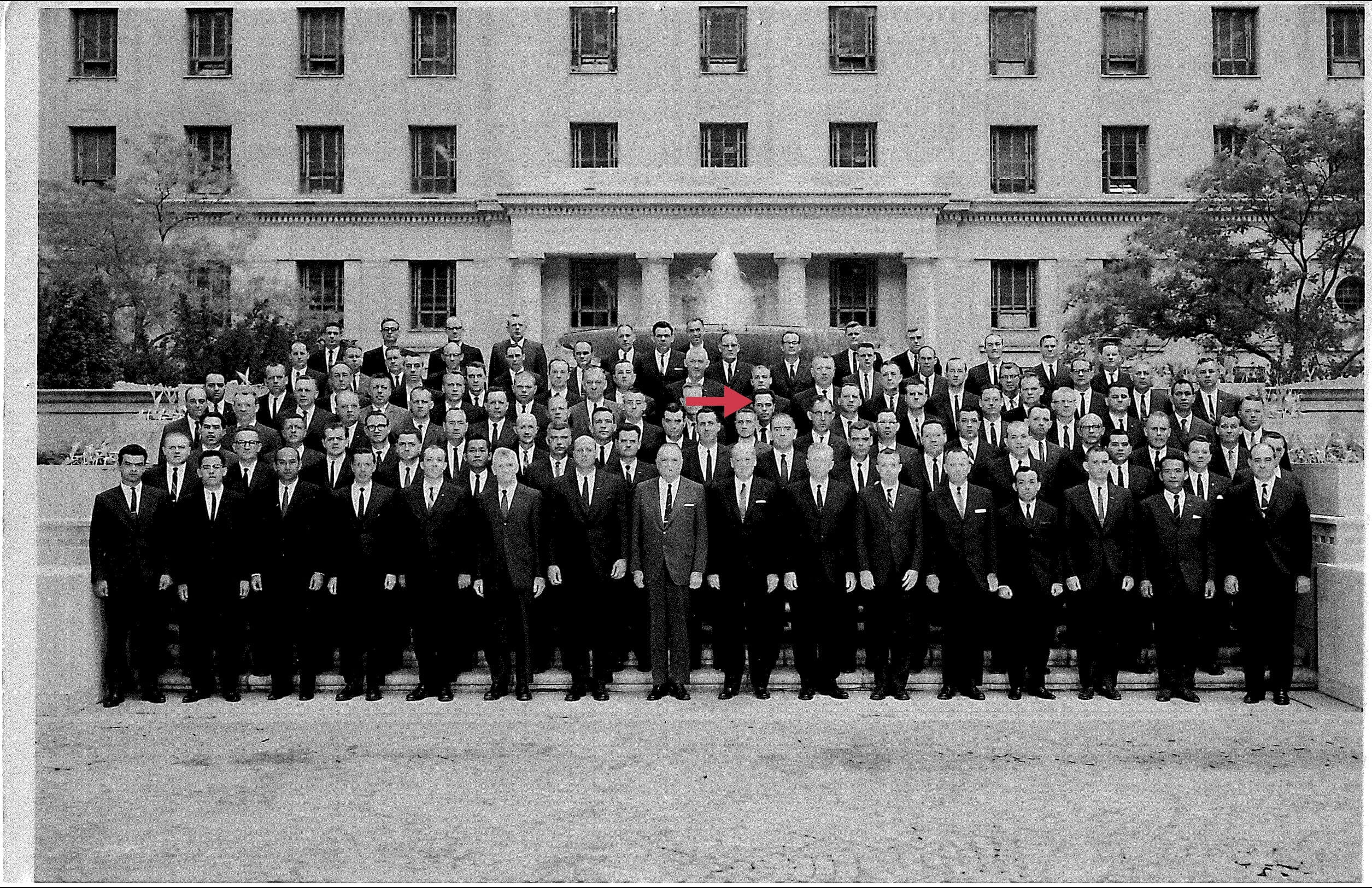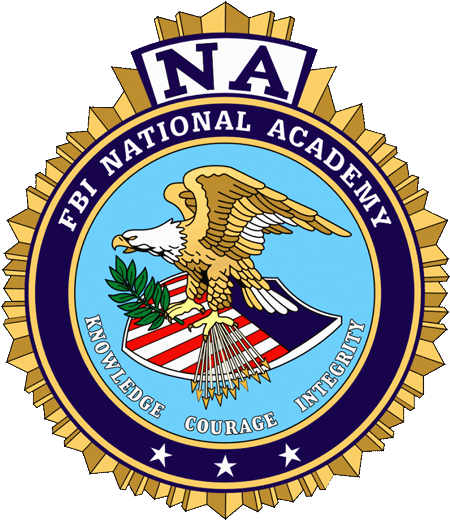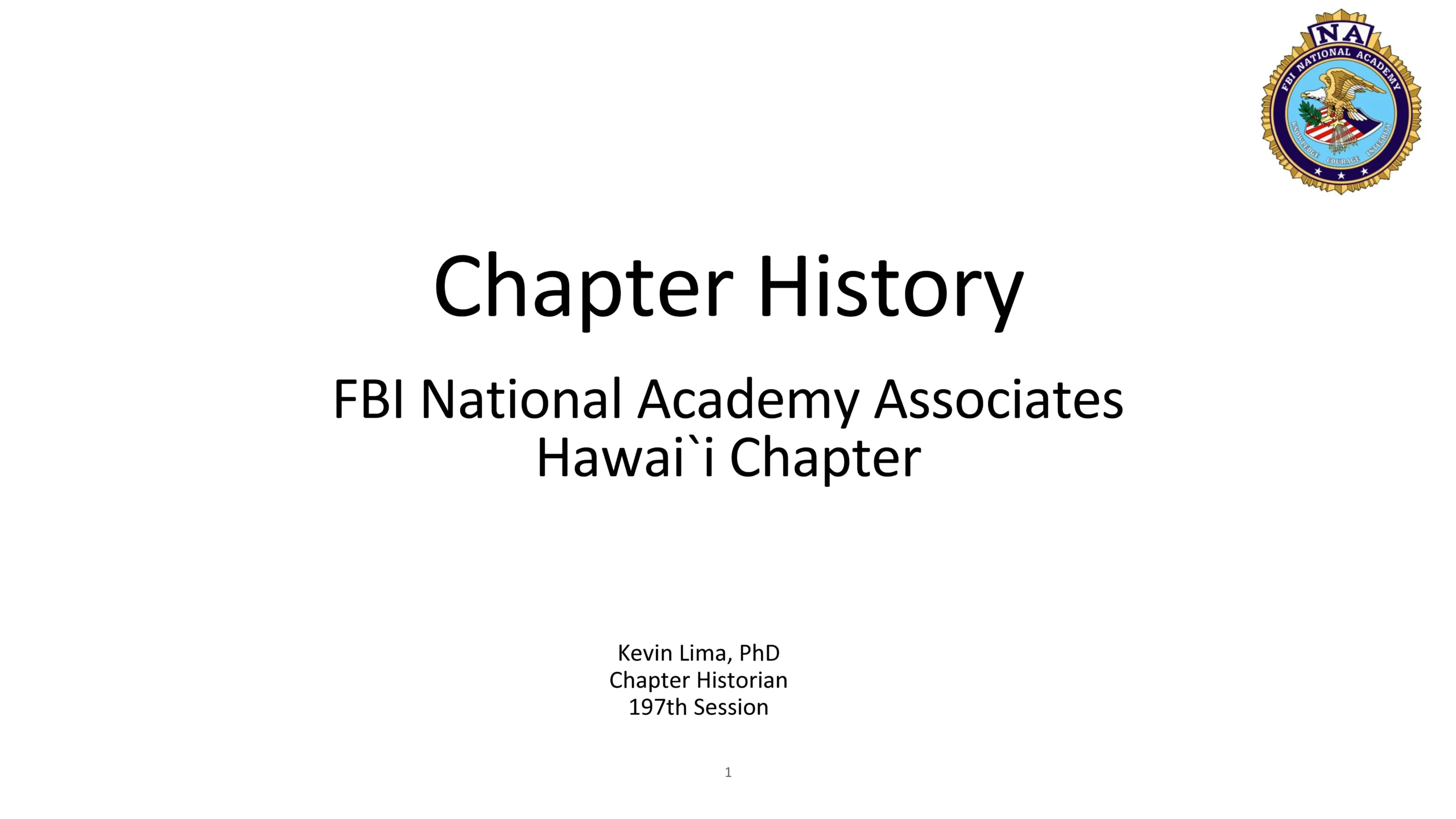CHAPTER HISTORY
Excerpts from a July 20, 2023 conversation with retired Honolulu Police Department
Assistant Chief Edwin Ross, National Academy graduate of the 79th session, June 7, 1967.

FBI NA 79th Session graduation photo June 7, 1967. NOTE - Ed Ross identified by red arrow.

Ed Ross now, at his home in Kahala, some 50 years later.
ER: Ed Ross KL: Kevin Lima
KL: How many years did you do (at the Honolulu Police Department)?
ER: A little over 28 years.
KL: What rank were you when you attended the NA?
ER: Sergeant. Solo bike sergeant.
KL: Was that a common rank in those days?
ER: No, most of them were lieutenants and above.
KL: Can you tell us about your assignments during your career?
ER: I had a good career there…solo bikes, I enjoyed that. But I thought about going higher in the department. And I knew that that was not considered real policing. I put in a transfer request for detectives. And I was called in to (Chief) Dan Liu’s office and I thought that’s what it was for, to be transferred to detectives. He asked me, he says, “Sergeant do you know why I’m calling you in?” I said, “To transfer to detectives, I hope.” And he says
“No, I wanted to talk to you about the FBI Academy. Have you heard of that?” I said, “yeah I’ve heard of it.” He said, “Are you interested in going to it?” I said, “Well only if it doesn’t affect my transfer to detectives.” He says, “That’s interesting.” And he had an FBI agent with him. And the FBI agent started laughing about it. I said, “I’m serious. I’m thinking about my career and not about going to another school.”
ER: I got an invitation to go to the academy and right away in the middle of the month I got transferred to detectives. In fact, CID, the Criminal Investigation Division major was upset that I was being transferred in the middle of the month. And he says, “Who do you know to get transferred like this?” And I said, “I don’t know anybody but I wanted to be transferred and the chief wanted me to go to the National Academy. So once I was accepted
he went ahead and allowed me to be transferred.” He (Fletcher) said, “As far as I’m concerned you may be a senior sergeant but you start at the bottom here. You’re just a rookie detective as far as I’m concerned. And you’ll go to a detail I tell you to go to. You start off at the bottom, you go to Mal Con (Malicious Conversion) Detail.”
KL: You graduated with the 79 th session, June 7, 1967. Can you tell us about your
experiences at the National Academy? Where was it conducted at the time?
ER: It was very different from what it is today. It was not as formal as it is today. The classes was just one class. Two hundred students in a session. And were split 100, 100. We had the same classes as everybody else. There was no special choosing any elective classes to go to. Going up there was paid for by the FBI. The Star Bulletin gave a grant to the police department. The Finance Officer at the time, Captain Fong, parceled out the money to me when I was up there. … He gave it out only when he felt I needed it. We paid for everything ourselves as far as clothing. We didn’t have uniforms, we had to wear navy blue slacks and a white standard shirt with tie, and the tie had to be a dark colored tie. And that was our uniform during the classes. Classes were conducted in a room at the FBI building in downtown Washington, DC.
KL: How long was the session?
ER: Twelve weeks.
KL: Did you live in dormitories?
ER: We were required to find housing within DC, and evidently they scrutinized the housing. So they had a list of where they suggested you stay. I stayed with Ray Duvauchelle who was a deputy chief from Kauai. We were the two people from Hawaii in the session. We stayed at the Windsor House, it was on 14 th and Rhode Island in downtown DC. We rented an apartment and we paid for it out of our pocket out of the monies that HPD had
given me.
KL: In general, overall, what is your feeling about your experience at the National Academy and the training you received?
ER: It was fantastic. The biggest thing was the camaraderie and meeting the people from the other departments. And the differences they had in their administration and their philosophy of police work. And this is just the time that Miranda came into effect. So it was interesting times there. Listening to what other departments felt about it. Initially law enforcement was against that, saying that it would curtail their investigative abilities by
having to warn suspects of their rights. But as you know it worked out fine.
ER: Our meals were up to us. We provided our own meals. To save money Duvauchelle and I walked from 14 th and Rhode Island to the Justice building to save bus fare…
ER: We were required to take notes in the class and prepare notes that evening at home. They issued portable typewriters to each individual. And at night we would type up the notes. And once in a while one of the FBI counselors would come by and see that we were properly preparing the notes. And at the end of the session, before the session was over, you had to turn in a notebook and that was part of your final appraisal, your notebook. In fact they chose an outstanding cadet, and it was based one-fourth on the notebook, a half on your grades that you got, and your research project, the other quarter.
KL: Can you share about receiving (your) diploma from your graduation?
ER: I don’t remember the presentation. I don’t remember the individual that presented it. I don’t remember if it was J. Edgar Hoover. I had met him. J. Edgar Hoover was a very interesting individual. Very bulldoggish I would say. When I met him I shook his hand, he grabbed my hand and he squeezed it. He had a very strong grip. And he looked me in the eye and he says, “When you go back to Hawaii, you say hi to Chief Liu for me, he’s a friend
of mine.” I said, “Yes I will sir.”
KL: Tell us about the formation of the Hawaii Chapter of the FBI NAA (in 1971).
ER: We decided we would have a Hawaii Chapter. And the graduates got together at the Ilikai Hotel, sponsored by Chin Ho, he owned the hotel at the time. And he sponsored the meeting that we had there. We had 27 members which would be the Hawaii Chapter. It consisted of people from Micronesia and the various islands, and from the federal government. And we got together and elected a president …and decided on how it was going to be run. And decided that we would make it so that you would have a president who would be from the island that that person was from. And then he would choose a
person to be a secretary/treasurer. And so it was kind of going through the chairs, Hawaii, then it would be Kauai, then the other islands. And we didn’t change that until, I forgot when it was, it was ’71 I think, where they changed that from being an appointed position to an elected position. And when it became an elected position I was the appointed secretary/treasurer at the time. And I ran for secretary/treasurer and became the first elected secretary/treasurer. And then served in that position for the next 25 or 26 years and then decided to vacate it and allow someone else the opportunity to run for it. And then Cravalho ran for it and became the next secretary/treasurer.
KL: Can you tell us about the first retrainer that the Hawaii Chapter conducted?
ER: It was at the Ilikai and … Chin Ho is the one that funded most of it. He in fact gave us fantastic prices for the (conference). Because we were paying most of it (the conference), was being paid for out of own pocket. The department (HPD) would not pay for us attending the retrainer. So I ended up being the spokesman to talk to the manager of the Ilikai to get … the prices down because it was all coming out of our own pockets. Chin Ho also threw in the Ali Ali Kai for (boat) cruises, beer cruise and everything. It was fantastic.
KL: How was the training that was conducted, do you recall the type of training?
ER: Every year we’ve had good training and good people. And usually the FBI would sponsor someone coming out here. That person would come out and do training for the local FBI office then do our’s the next week. We’ve had all kinds of people come out and really good. In fact we had detective who did the OJ Simpson murder case. They came out here, and that was an informal with them. It was really interesting. … I think the training was very beneficial.
KL: Is it the same structure now where the president is the host and at the conference the president will end his term and the next president will be sworn in?
ER: Right at the business meeting on the last day … that’s when the selection is made for the next president. And at the banquet, we usually have a banquet at the end of the training session, and at the banquet it’s when the new officers are sworn in.
ER: Guam, said that they wanted run a conference. We ran a conference in Guam. The island that was up to be selected for vice-president gave the slot up to Guam so that Guam could do it. Another year the military was upset that they weren’t given, afforded the chance to be in the hierarchy and the colonel from the Air Force stated that he wanted to be president. We talked about it and we talked to the person that was coming up to be the president and he was willing to give up his slot to allow this colonel to become the president and he became the president. And that was the only year that we did that. Then it went back to the vice-presidents.
KL: How do you feel about the purpose and the value of our chapter to law enforcement here in Hawaii?
ER: The biggest thing is the camaraderie that we had shared with the other members. And it also helps the people that were still in law enforcement in that if you had any active cases or anything. Cause you always could call some other member from another chapter and identify yourself and they would bend over backwards and give you cooperation on criminal investigations on other policies, policy changes, and stuff. Like when we decided what our rules would be on pursuit driving and stuff. Having access to the other the departments, straight access not having to go through the hierarchy really helped.
KL: Where do you see the Chapter moving or heading to, what is your hope or the successes for the Chapter in the future?
ER: I think just continuing the same way is beneficial to Hawaii and to and for the other Chapters. Like one of the things they were really surprised about was, when I was going to the Academy, and I mentioned our patrol plan and that we subsidized vehicles. Now none of the others had done that, other chapters. So providing them with that information. Some of them provided vehicles that they took home, private vehicles, and I brought that back to Honolulu, they didn’t go with it. But that was another possibility. So sharing experiences I think was very helpful in law enforcement to make sure that we touch all the bases and consider all the alternatives. A lot of times our experience is a lot different from what is on the mainland and even from the foreign countries. Because we had members from foreign countries that attended the academy.

